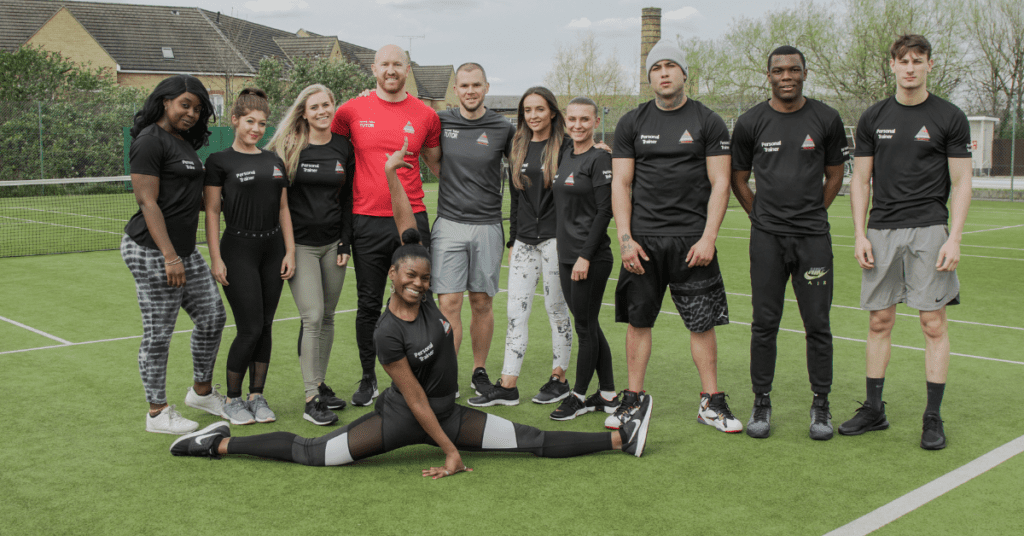There are two main ways of getting certified as a personal trainer. You can choose to go through an apprenticeship or enrol in a private course from a recognised training provider. There are pros and cons for both options, depending on your circumstances and what fits best with your lifestyle. Here we will take a look at both approaches.
Over the past few years, personal training has become one of the most sought after services in the fitness world. With 21,544 registered personal training businesses in the UK according to IBISWorld, the personal training market is worth £536m and is expected to rise.
With the continuing demand for personal trainers, the industry needs new passionate professionals to fill the gaps. If this is a career that is of interest to you it is prudent to analyse the different approaches to gaining your certification.

What is a Personal Trainer Apprenticeship?
A personal trainer apprenticeship combines experience in the workplace with classroom learning. It provides an opportunity to learn a new skill for free whilst earning a wage in the workplace. Following the completion of an apprenticeship, you will gain an NVQ qualification.
Pros
You earn on the job
With an apprenticeship, you earn a salary or hourly rate whilst working and learning on the job.
No fees
You pay no fees for the training; you only dedicate your time to learn as much as you can.
Experience
You gain first-hand experience by observing and participating during training sessions. You also gain valuable insights into the best practises adopted by professionals
Recognised qualification
After the successful completion of your personal trainer apprenticeship, you will gain a recognised qualification. You may immediately begin to practice and can take on your own clients.
Cons
Low pay
Although you are entitled to a salary or hourly rate during your apprenticeship, this is usually a basic wage which some may find hard to live on. At the time of writing this article, the hourly rate for an apprentice in the UK is £4.30 per hour. Visit the gov.uk website for the most up to date pay and condition requirements.
Long Duration
It takes about 12 to 15 months to complete an apprenticeship. This is not ideal if you are looking to start your new career quickly. This will also delay your ability to start earning a higher wage.
Low Rate of Completion
Due to a combination of the apprenticeship length, low wages, and sometimes demanding work placements, there is a low completion rate. You have to be of steely focus and strong-willed to make it through an apprenticeship.
Work Limitations
Although apprentices gain a lot of first-hand experience, they are often restricted from engaging in some aspects of their work due to legal structures. In some cases, apprentices are required by law to have possessed a certain certification before they can perform some activities.

What is a private course?
Private training companies provide courses usually for a fee in return for a specific qualification. A reputable training company will be accredited by an awarding body and follow strict guidelines. Typically, private training companies offer courses via classroom or online learning and don’t require work placements. Therefore, these courses can be completed quicker.
Pros
Short Duration
On average, completing a personal trainer qualification through a private course provider takes between two to four months to complete. Compared to 12 to 15 months on average for an apprenticeship.
Flexible Study
Most private course providers offer flexible learning options such as online personal trainer courses. These flexible courses allow you to complete your training at your own pace. Having flexibility is ideal for people who are unable to give up full-time work or have other commitments to manage whilst studying.
Higher earning potential
As we have highlighted, a private course can be completed within just two months vs 12 to 15 for an apprenticeship. This means you can start working as a personal trainer quicker, giving faster access to clients and earning a full personal trainer salary.
Funding options
Although there is no cost to an apprenticeship, some private training providers offer funding options to help pay for tuition costs. Some of these funding options allow you to train and not pay anything back until you reach certain income thresholds.
Cons
Cost
The cost of a private course will be payable by the student, however some accredited facilities have funding options that can be used to cover these costs.
No work placement
A private course will not offer you a work placement like an apprenticeship does. However, there are work experience opportunities through certain private course providers. Here at UK Sports Training, we can provide work experience through our recruitment partners to help build your confidence. Furthermore, we provide practical workshops throughout the course, which provides first-hand experience in a gym environment.
No income
As a private personal trainer course is not based around a work placement, you are not paid whilst studying. However, as you can complete your course within 2 months, you have the opportunity to earn a personal trainer salary quicker, rather than the minimum wage offered through an apprenticeship. Furthermore, private courses provide flexible learning so you can continue working in another job whilst studying for your new career.

Weighing Up The Options
Looking at the pros and cons of personal trainer apprenticeship and private courses, you can see some good arguments for both options. The route you take will depend on your circumstances and what you are looking to get out of your learning experience.
Choosing A Personal Trainer Course
If the private course route fits best with your lifestyle, then UK Sports Training can help!
Our personal trainer courses are designed to arm you with the essential skills, knowledge, and core competencies to ensure that you can hold your own when you begin to work as a professional PT. Our industry professionals give practical examples of the experiences, and you will be mentored and guided throughout your study.
To find out more, contact our career advisors or fill in the form below and someone from our team will be in touch.
We wish you all the best on your personal training journey!

